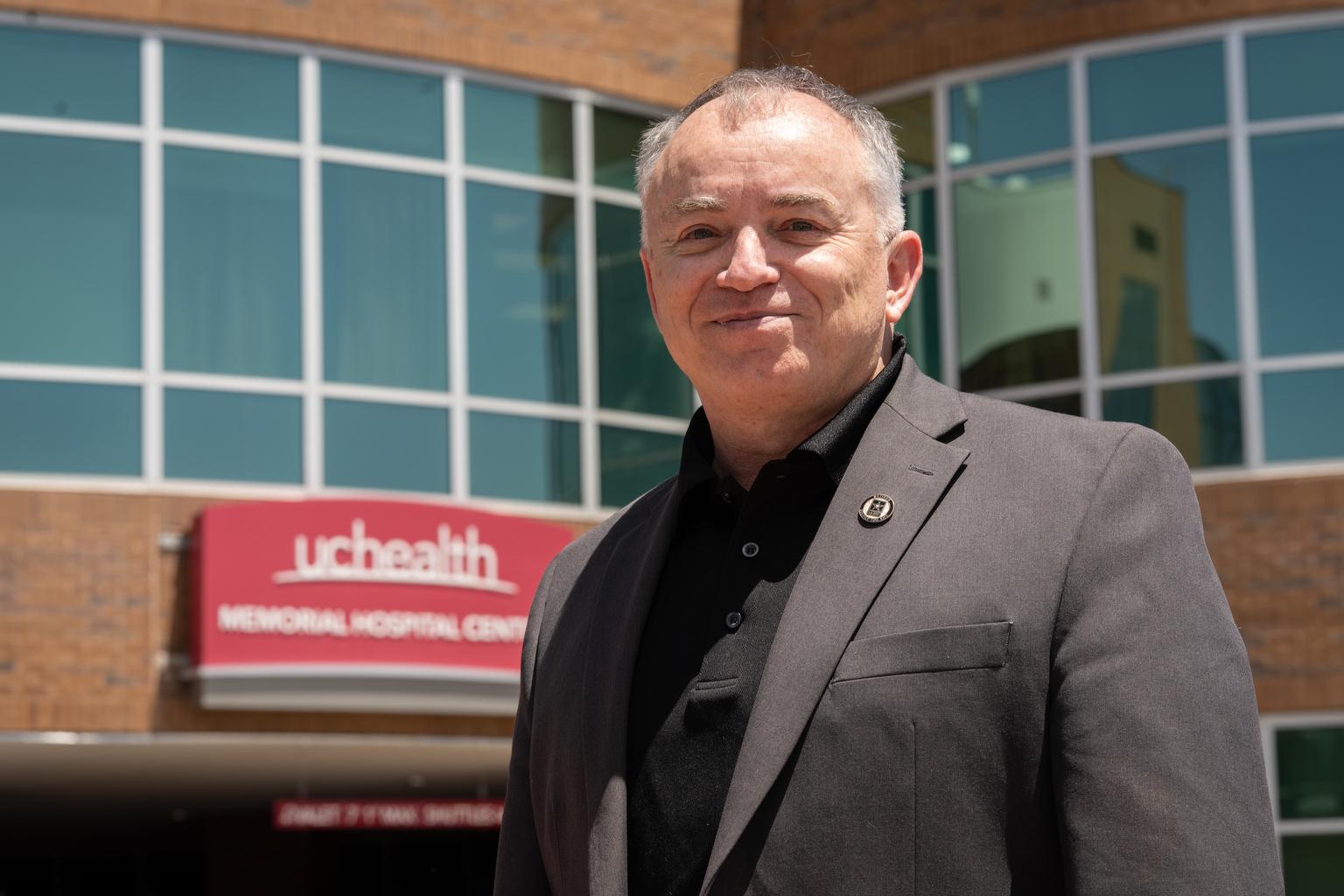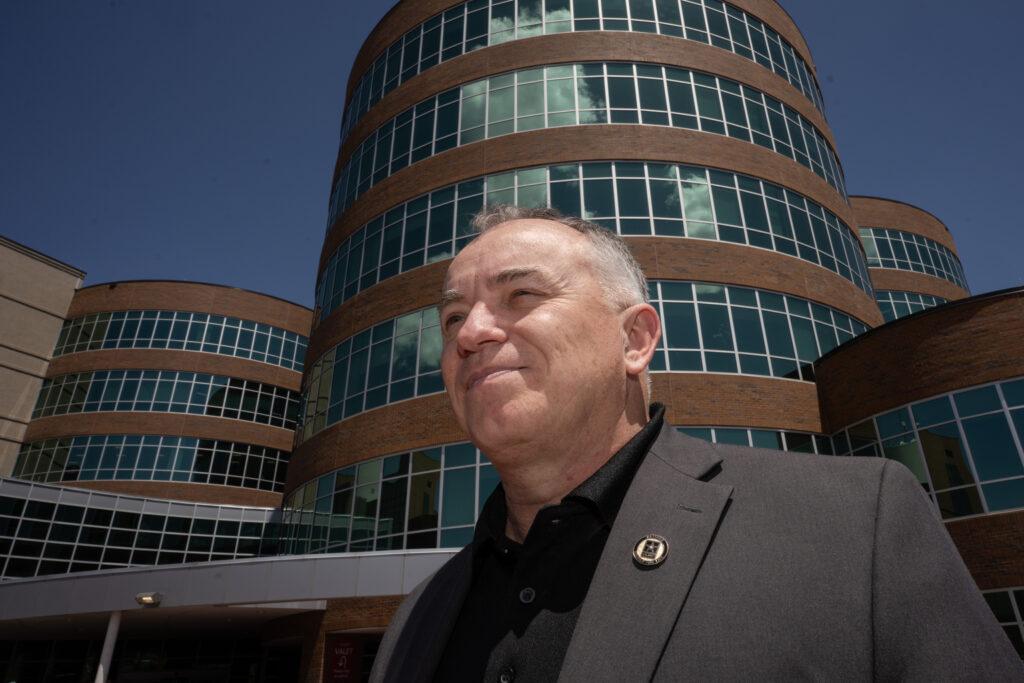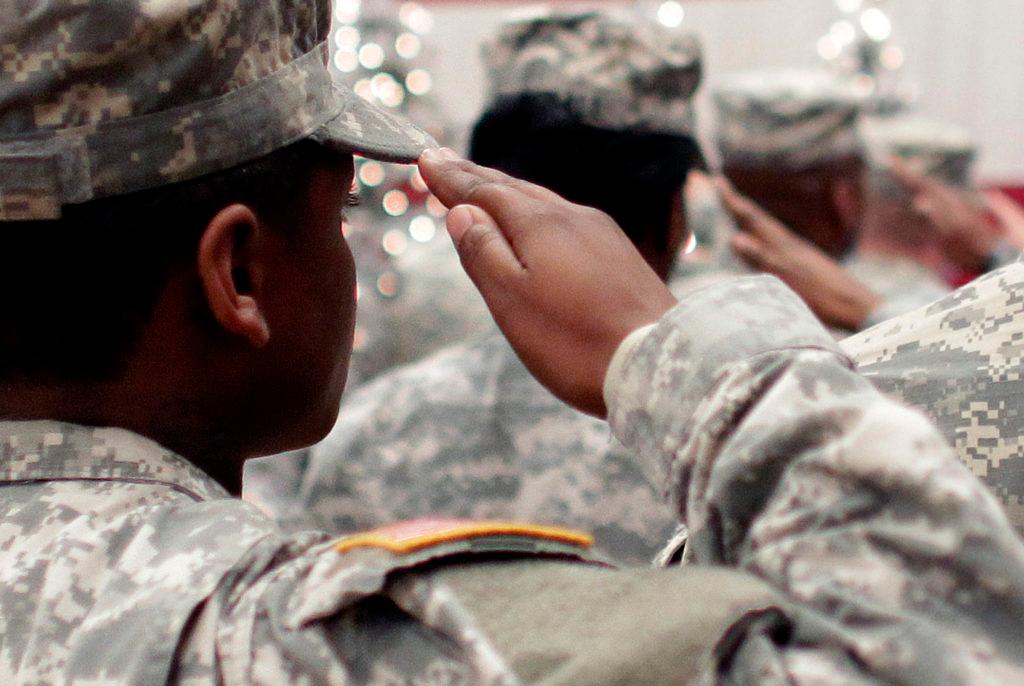
Editor's Note: This story contains discussion of self-harm. If you or someone you know is considering suicide or other acts of self-harm, please contact Colorado Crisis Services by calling 1-844-493-8255 or texting “TALK” to 38255 for free, confidential, and immediate support.
In 2021 roughly a third of the suicides reported in El Paso County were military veterans. Searching for a new approach to prevention, the state-backed a program called Next Chapter that goes beyond traditional mental health counseling to provide a range of services that keeps everyday challenges from morphing into crises.
The program started in 2022. Organizers figured it would serve 700 veterans and their families in the first year – in fact, it’s now served around 1,000 people and expanded to Pueblo and Teller Counties.
Colorado Matters senior host Ryan Warner spoke with Next Chapter’s co-founder, Damian McCabe, who is director of behavioral health and military affairs at UCHealth in Southern Colorado.
If you’re in crisis, reach the national lifeline at 988.
Read the interview
Editor’s note: This interview transcript has been edited for length and clarity.
Ryan Warner: There’s a reason you call this program Next Chapter. What's the message you're trying to send there?
Damian McCabe: In the development of the program, we thought hard about veterans and how veterans receive their care. And one of the things veterans (are known for) is we're usually the first to offer help and the last to accept help. And so we wanted to frame this…
Warner: And you say we, because you too are a veteran. You speak from experience.
McCabe: Yeah, and I think that's one of the principles of the program is that all of the staff, the UCHealth staff, are veterans. We recruited a team specifically to serve in this program, and the ability for us to message to the veteran community and their families took into account the difficulty we have in engaging veterans in getting care.
Next Chapter was a way for us to frame access to care as, what's the next chapter in your life? What do you do after the military? What do you do when that identity, purpose, and mission that you had in the military has shifted or changed or in some cases been taken away from you by way of disability or impairment as a result of your service in the military?

Warner: Contrast that for me with the approaches and the branding that have preceded this. Why do you think that's a more successful message?
McCabe: Nobody in general, but particularly military and veterans, wants to be told that they have an impairment or a disability or that they can't be who their entire identity around the military was. We didn't want a title that suggested an impairment to physical or mental well-being or an impairment in their ability to function after they left the military.
Really we wanted to frame it as, tomorrow's not written, what you do today informs what will be in your next chapter tomorrow and it doesn't matter if that's a crisis or addiction or just needing to find a job, or relationship problems or financial problems. Tomorrow is not written and we want to be a part of helping them write that.
Warner: That's a really important list that you just cited. It's comprehensive. This is not straightforward.
McCabe: No.
Warner: Nor is it one size fits all.
McCabe: Absolutely. The concept of suicide and why people take their own lives is a very, very complex psychosocial circumstance in anyone's life and so to have a program that focuses on just one element really wouldn't serve the need of veterans – or anyone for that matter.
When veterans come out of the military, it's almost as if they have to reconstitute their life. Every aspect of it, not just their life, but their family and support system’s life. It is employment, it is finances, it is the relationships they have, whether they be friends, employers, intimate relationships, even the relationship they have with themselves. All of those things can contribute to psychosocial crisis or impulsive behavior or a choice to use substances to cope. And so if we are not looking at all of those things in a very holistic manner, there's a very chance we're going to miss the key indicators when someone does end up in crisis
Warner: You invoked suicide there. And it occurs to me that in that name, Next Chapter, is the notion that any number of veterans don't feel that there necessarily is a next chapter. They may not be able to see that for themselves. El Paso County where we sit today, has a very high suicide rate among veterans and that is what helped secure state funding for this program. Where is the best place to meet a veteran and is it right after their service or is it 30 years after their service?
McCabe: If we had those answers, Ryan, we wouldn't have the data that we live with today. I think what you're identifying is the complexity.
It could be 10 months before they leave the service. It could be 10 months after they leave the service. It could be 10 years later or in the case of our Korean and Vietnam War veterans who are still struggling, it's 60 years later. We have tried hard to message directly into the veterans community, with the entities in the community that support veterans. So think VFW, American Legion, but also health care – primary care providers, specialty care providers, the Veterans Administration, the Veterans Healthcare Administration.
Warner: Damian, this notion that someone for 60 years might've been struggling and not yet gotten help, that's astounding to me given what I imagine is the network that's in place – the VA, the various clubs and organizations you've mentioned. How is this possible? How are there still folks falling through the cracks from these wars?
McCabe: Well, some of it is falling through the cracks, but the other part of this goes to the ethos of the military of not wanting to be a burden. Some veterans have isolated, some veterans don't want anything to do with the VA, especially when you think about Vietnam veterans – they didn't receive a good welcome home. In fact, many won't go near the VA because of legacy biases or legacy issues with the VA.
Sadly, I can share with you in El Paso County with the most recent data that we have, of the last five confirmed suicides, four of them were over 70 years old. So you do the math, you know what conflict they served in, and it isn't the most recent 20 years. So between the veterans' ethos of isolation, being independent, it makes it hard to reach them and clubs and fraternal organizations are almost always voluntary, so unless they choose to reach out and be a part of it, they deny themselves the opportunity for the assistance.
Warner: Which speaks to a certain extent to isolation, doesn't it?
McCabe: Absolutely.
Warner: And it must be very difficult then to make inroads into a community that is isolated.
McCabe: I think one of the things we've done most to breach that isolation is to ensure that the first contact that anyone has with Next Chapter is with another veteran. It's someone who can say, ‘I've been there. I've walked in those shoes. Let me help.’

Warner: It's so interesting because I think when I picture veteran suicide, I am inclined to think of younger people. And so it's a real awakening for me to hear you say that it's also 70-somethings.
McCabe: We have the younger veterans, those 22 to 35- or 38-year-olds that deal with family challenges, finance, employment; our oldest veteran enrolled is 95 years old. The issues are different as a veteran gets older and maybe as family members pass on, that sense of being a burden to others grows.
Warner: This is an aging issue in addition to being a veterans issue.
McCabe: Absolutely. There's an aging issue here. There's a relationships issue and how relationships change over time. There's a dependency issue, especially for our seniors when they realize they become more dependent on the healthcare system. If the healthcare system is not there or it's burdensome or they're made to feel like they're not a priority in the healthcare system, then that isolation piece comes back again.
Warner: So how many folks are you working with? I'll just say you started in July, 2022. And I say working with, because treating doesn't seem to capture all that you do.
McCabe: That's actually a great sort of synopsis of how we approach this. We were tasked originally to support 700 veterans in their families. (As of June 11, the program has served 993 veterans.)
Warner: So can you point to a success rate at this juncture?
McCabe: What we can point to is the same data that caused us to get into this in the first place, and that is the El Paso County coroner's suicide rates. In 2021, one in three suicides here in El Paso County was a veteran or military-affiliated person. That does not include family members. That's just the veteran or the service member. Next Chapter began in July of 2022. The 2022 data saw a five percent overall reduction in the share of suicides in El Paso County that was made up by veterans or military members.
Warner: Is that a notable number, five percent?
McCabe: Five percent is huge. What we expected was to stop the growth because three years prior to that, it just kept climbing and climbing and climbing. Our initial target was to arrest the growth in this share of the overall suicides. In terms of real lives that was a seven percent reduction of veterans or military members that were lost from 2021 to 2022. We take that as a measure of impact.
I am hesitant to use the word success, Ryan. Suicide is a very complex problem to understand and I think it's also a very complex problem to try and derive what is success. With that surprise finding in 2022, we're kind of bracing this year that we'll have a finding more consistent with what we expected, which is maybe a plateauing (of suicides), so it's not increasing, but we don't expect it to grow. We expect the impact to be lasting.
Warner: You've invoked families several times and folks otherwise close to veterans. Is the suicide rate elevated in those communities as well? And what does it mean to engage them in this 360-degree approach?
McCabe: Being able to track the impact of suicide in veterans families or military families in children or adults is very, very difficult.
Warner: Who do you count?
McCabe: Exactly. When the program was formulated, the legislation allowed us to consider anyone the veteran defined as a family member as eligible for services, and the program serves veterans regardless of discharge status. You probably know that the VA does not serve veterans who have anything other than an honorable discharge. For example, in the most recent conflict, a lot of folks were discharged secondary to head injuries or substance use, and they received other than honorable discharges, meaning they had no benefits when they got out. Our program charter allows us to serve anyone regardless of discharge, regardless of period served. And if the veteran defines a person close to them as family, we can serve that person too.
Warner: Just this notion that the VA was not serving the people who might most be in need because their records weren't sterling, but it's very likely their records weren't sterling related to the issues and the trauma they were dealing with. I mean, talk about a Catch 22.
McCabe: Yeah. If you go back and look at some of the media from around 2010 to about 2015, you'll see that Fort Carson, our local installation here, was one of the sites where the DOD did a large investigation where folks who had served, had been harmed, came back, acted in ways that were incompatible with military service, were summarily discharged without necessarily having full consideration of the impact of their time and service and how that contributed. What that means is there is a whole slice of veterans out there who are not eligible for VA care, VA healthcare.
Warner: Okay. Back to families. What does it mean to support a family member? Give me an example.
McCabe: If you're a veteran and you're doing okay and then one of your children gets injured or one of your children gets in trouble with the law and now there's a new financial burden on your family, all those other things that were in balance for you now can go out of balance.
Let’s say a veteran has a child who's struggling in school or maybe gets in trouble with the law and underneath that is some sort of separation or maybe a mental health concern like depression or anxiety that's fueling that, but the veteran can't find a service for that child. Well, we can and we can underwrite it.
Warner: Underwrite it. You can help pay for it.
McCabe: Correct. We can also find it, and access to care is critical. If we lessen the stress on the veteran, then we're serving the veteran at the same time.
- Interview: Colorado’s Veterans Affairs Board has its first Tribal member. Here’s what he’s hoping to accomplish
- Two ‘unclaimed’ veterans were laid to rest at Pikes Peak National Cemetery as part of an effort to remember the almost forgotten
- Through Their Lens: Veterans find artistic outlet through photography
Warner: I don't know why this phrase is coming into my head, but it's like a veteran's concierge. I'm imagining that you are building the plane as you fly it because there are needs you're not going to have anticipated,
McCabe: We hope we're not building the plane as we fly it, but some days it feels that way. But in the main, I will say that the vast majority of veterans ask for support either within the behavioral health domain or life skills, adjusting and being successful, and so the program in a way really sets about taking that strengths-based approach.
Warner: What haven't you perfected? I'm thinking it can't be that easy to get a veteran into one-on-one therapy if they've resisted that for some amount of time. What's the sticky wicket here?
McCabe: I think the sticky wicket for veterans will always be the ability to approach and recognize and honor their sense of identity, their sense of mission and their sense of purpose. Historically when you go into our health care system it's because there's something wrong with you and so for us, the challenge is finding providers who are culturally competent to meet veterans where they're at. We've done our best to train as many folks as possible, but we have still a long way to go
Warner That cultural competency … speaking a slightly different language.
McCabe: Substantially different…
Let me give you an example. As a therapist, it may not be a surprise to have someone come in and disclose to me that they're thinking of maybe taking their own life or maybe tell me a story about their own particular trauma and their experience of it …
My next patient comes in and tells me about the effect of combat on them, tells me about death and dying, of seeing bodies, of seeing mutilation, of maybe taking another person's life and feeling both guilty that it may have happened and proud in this same breath because they may have saved their brothers and sisters' lives, but they still are human and they still may feel guilty that they took a life. That's a huge challenge. It creates a lot of moral ambivalence. It creates a lot of what we call cognitive dissonance within the individual and the therapist and so what we find is some therapists don't want to do this work, and that limits access to care.
So it's more than just a different language. It's being able to sit at peace with a veteran who's about to maybe disclose some pretty, pretty horrible things that they're struggling with and they're asking you to help them put that into a place they can manage it.
Warner: Thanks for helping me understand that. Is there any part of you that's mad at the federal government that you have to play this role? I don't know. Listening to you, I have this reaction: Why isn't this provided by the nation that sent them to war?
McCabe: That is such a great question, Ryan. It's a huge question. And it can be approached at many, many levels. And so there is simply the logistics and the bureaucracy of providing this kind of service. Over the years, (the VA) has become a very large federal agency. One of the challenges in any large federal agency is it becomes more and more difficult to get to a local personalized solution.
It's a very difficult question, but people need to ask it and we ask it a lot. What is the value of a life? While there may be efficiencies, maybe cost savings also, what is the price of a life? What is the cost to that individual, their family? What does the federal government rate that life at?
Warner: Are there communities besides Colorado Springs that are doing this well or where you could see this be replicated?
McCabe: Our goal is to replicate this up and down the Front Range. We started in El Paso County, we extended into Teller County and now the state Behavioral Health Administration asked us to extend into Pueblo County and we've done that too.
Warner: I just want to talk a little bit about your own background. Often before we start rolling on interviews I'll ask people where they're from and you shared that you grew up in Belfast, which is not a place immune to war and to conflict and to trying to live a daily life even as those things are raging. It seems to me you've spent the vast majority of your time on the planet at least aware, if not really close to, war and to conflict. How does that shape your every day now?
McCabe: No one would ask for sort of the experience I've had. My first experience of warfare as a 4- or 5-year-old child was bunkering from rockets and mortars and gunfire. My father was in an internment camp. Our house was raided by soldiers on a regular basis. So it was quite ironic that I joined the military after graduate school and then of course to deploy in the most recent conflict into a country where I am the person in uniform, literally on the other side of that kid who's trying to live that life in the same circumstance I had.

Warner: Where was that? Just be clear.
McCabe: Most recently, Afghanistan in 2016
Warner: And to be thinking about the young people coming up in Afghanistan for whom that was the everyday.
McCabe: It was a very surreal experience. But at the same time, I was in full battle gear with weapons and knew that there was threat that I was reminded of relatively frequently when rockets would come in – that this wasn't Belfast and I'm not that kid anymore.
I think one of the things it has done for me, it reinforces my commitment to continue to serve within the veteran communities. In some ways, there's a comfort for me, professional comfort. I know how to do this, and in other ways I get to be a champion. And boy, there's nothing greater, nothing more rewarding than a veteran or a veteran's family that comes up and says thank you for what you've done for them. It doesn't take a lot to kind of poke that pride. For me, it's an extension of my military service. It's an extension of my chosen profession as a clinician. I'll quit the day I come to work and it's not fun anymore. And I don't mean fun in the sense of other people's pain, but it is absolutely rewarding to be in this space and I'll continue to do it.
Editor's Note: This story contains discussion of self-harm. If you or someone you know is considering suicide or other acts of self-harm, please contact Colorado Crisis Services by calling 1-844-493-8255 or texting “TALK” to 38255 for free, confidential, and immediate support.









